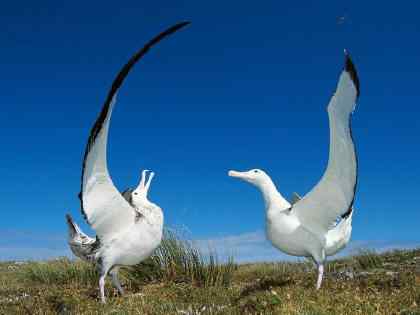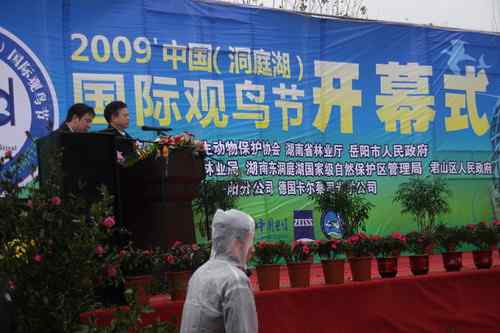政府民间都需要重视生物多样性
为了迎接10月的生物多样性公约大会,国际鸟盟在“科学”九月号发表文章展望2010年以后的生物多样性保护。
From government policy to personal choices, we must recognise the value of biodiversity
09-09-2010
As the world’s governments prepare to meet in Nagoya, Japan, to set new targets for halting biodiversity loss, authors from BirdLife International are among a group of leading conservation scientists and practitioners calling for a fundamental shift in the way we view biodiversity.
In their paper, published today in the journal Science, they argue that conservation of biodiversity is essential for the maintenance of vital ecosystem services, and ultimately for human survival. But they make clear that until governments, businesses and individual people begin to take the real value of biodiversity into account in their choices and decisions, the diversity of life on Earth will continue to decline.
Despite international commitments and an increase in conservation efforts worldwide, the rate of biodiversity loss has not slowed down. Recent assessments show a continued overall decline in populations of wild species and in the size, connectivity and condition of habitats, with accelerating risk of extinctions, and a steep fall in the benefits that we can rely on biodiversity to provide.
biodiversity is essential for the maintenance of vital ecosystem services, and ultimately for human survival.
Former BirdLife Chief Executive Dr Mike Rands, Director of the Cambridge Conservation Initiative and lead author of the paper, said: “If we are to make any kind of impact, it is critical that we begin to view biodiversity as a global public good which provides such benefits as clean air and fresh water, and that this view is integrated not just into policies but also into society and individuals’ day-to-day decisions.”
Dr Rands and his co-authors recognise that biodiversity loss is typically the result of unintended human actions, and therefore raises unique difficulties. “The impacts of a particular action are often distant in space and time. This makes effective regulation difficult, as no single body has jurisdiction over the world’s biodiversity.”
Citing recent estimates that the economic value of benefits from biodiverse natural ecosystems may be 10-100 the cost of maintaining them, the authors argue that retaining stocks of natural capital should be an integral element of government policy-making. But making the economic value of biodiversity clear will not be enough to bring about a change in behaviour without the support of policies which reward positive action and penalise harm.
“Because we receive benefits from biodiversity for free, we take it for granted” —Dr Leon Bennun, BirdLife Director
Biodiversity should not be considered in isolation as part of a nation’s environmental agenda, but must extend across all sectors of government from treasury to defence. “Perverse subsidies” which encourage farming, fishing and forestry activities that damage biodiversity will need to be removed.
We now have a better idea of what kinds of conservation actions work. The authors say that action for species, such as habitat management and restoration, removal of invasive alien animals and plants and captive breeding, have provided some notable successes. Among many examples, between 1994 and 2004, at least 16 bird extinctions were prevented by conservation action. But the authors urge that these successes need to be replicated and massively scaled up. Greater investment by at least an order of magnitude is needed.
The authors stress the need for greater support for conservation efforts in developing countries that are rich in biodiversity, investing in conservation knowledge and expertise, sharing experience, and building strong institutions with links to policy makers and wider society.
"As a network of civil society organisations around the world, BirdLife are working with communities, corporates and governments to bring about crucial changes in attitudes, and to find ways of generating wealth while protecting and restoring nature" —Dr Leon Bennun, BirdLife Director
The authors acknowledge that changing society and individual behaviour in favour of sustainability and biodiversity conservation presents daunting challenges. Conventional measures of well-being focus on wealth creation and economic growth, often at the expense of biodiversity. Economists and conservationists must work more closely with each other and with policy makers to develop incentives and regulations to shift individuals, governments, businesses and civil society toward more biodiversity-friendly behaviour.
“Because we receive benefits from biodiversity for free, we take it for granted,” said Dr Leon Bennun. “This has to change. In the run-up to Nagoya, as the United Nations General Assembly meets for a special session to discuss biodiversity, this is an especially timely and important message for world leaders to take on board.
Dr Bennun added: “Our paper highlights a gap that often exists in conservation. In between generating sound knowledge and designing innovative responses, we need the right institutions for monitoring and governance, and appropriate changes in social behaviour. As a network of civil society organisations around the world, BirdLife is helping create those institutions. We are working with communities, corporates and governments to bring about crucial changes in attitudes, and to find ways of generating wealth while protecting and restoring nature.”
--------------------------------------------------------------------------------
The paper ‘Biodiversity Conservation: Challenges Beyond 2010’ by Rands MRW, Adams WM, Bennun L, Butchart SHM, Clements A, Coomes D, Entwistle A, Hodge I, Kapos V, Scharlemann JPW, Sutherland WJ & Vira B is published in the 10 September 2010 edition of Science.
Drs Leon Bennun and Stuart Butchart are both based at BirdLife's International's Cambridge, UK Office













发表评论:
◎欢迎参与讨论,请在这里发表您的提问或看法,交流您的观点。